【2015中考复习方案】(译林牛津版·全国)2015届九年级英语复习课件(自学反馈+重点突破):第1课时 Units+1—4 [七年级上册](共38张PPT)
文档属性
| 名称 | 【2015中考复习方案】(译林牛津版·全国)2015届九年级英语复习课件(自学反馈+重点突破):第1课时 Units+1—4 [七年级上册](共38张PPT) | 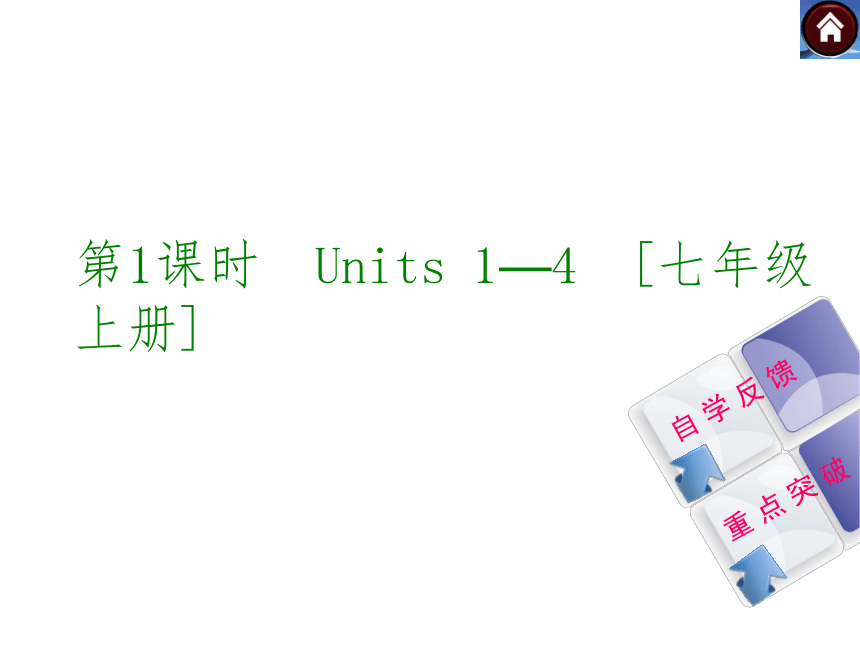 | |
| 格式 | zip | ||
| 文件大小 | 272.2KB | ||
| 资源类型 | 教案 | ||
| 版本资源 | 牛津译林版 | ||
| 科目 | 英语 | ||
| 更新时间 | 2015-01-17 19:57:22 | ||
图片预览

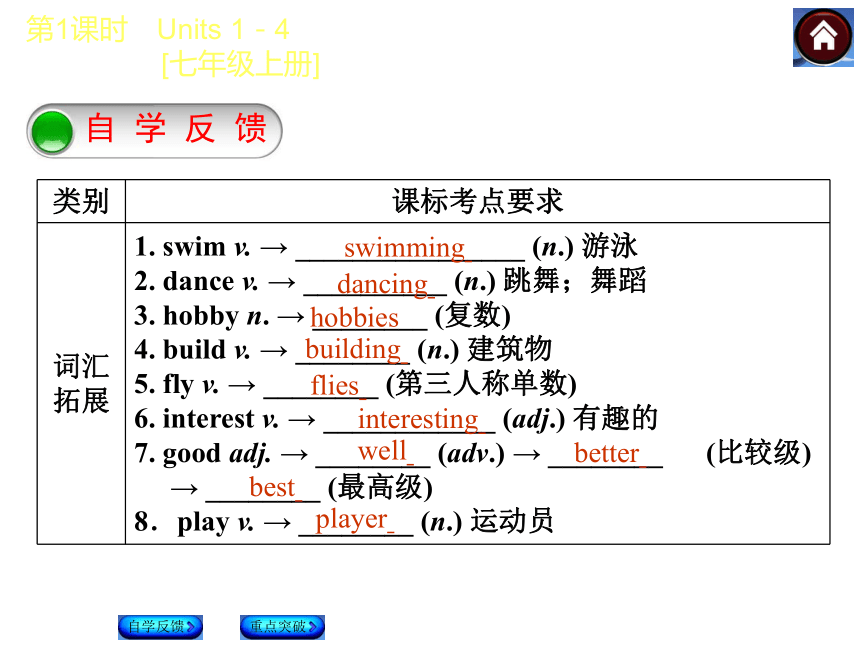
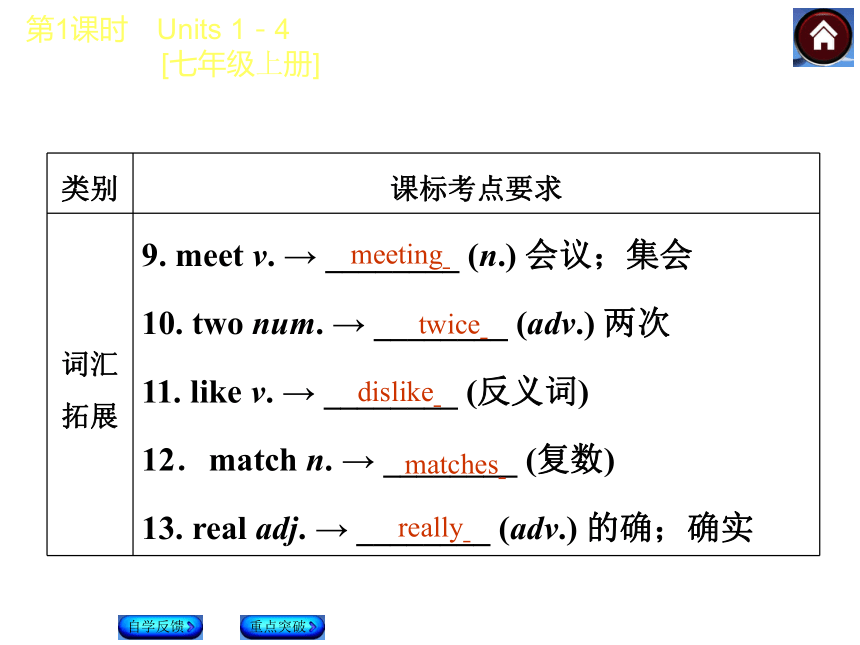
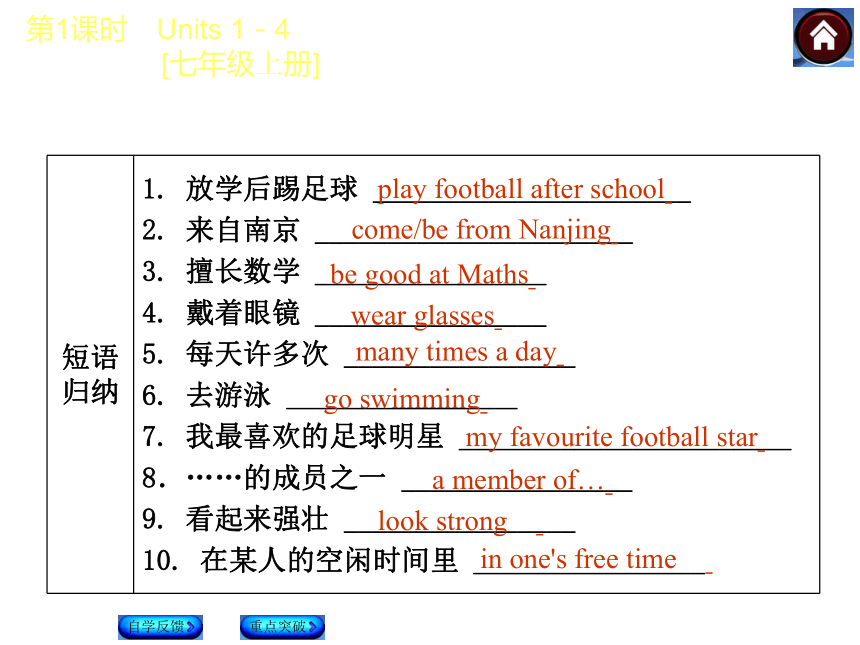
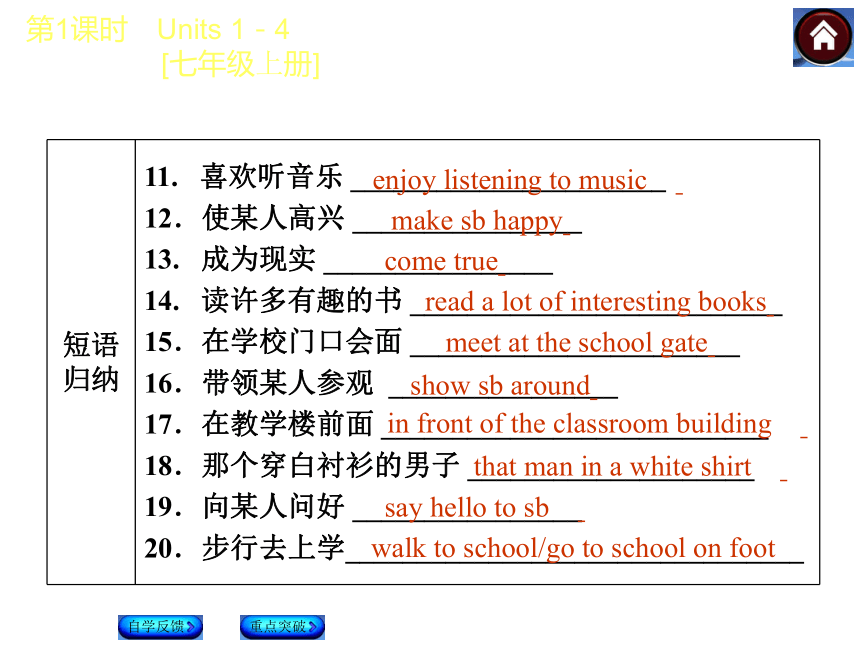
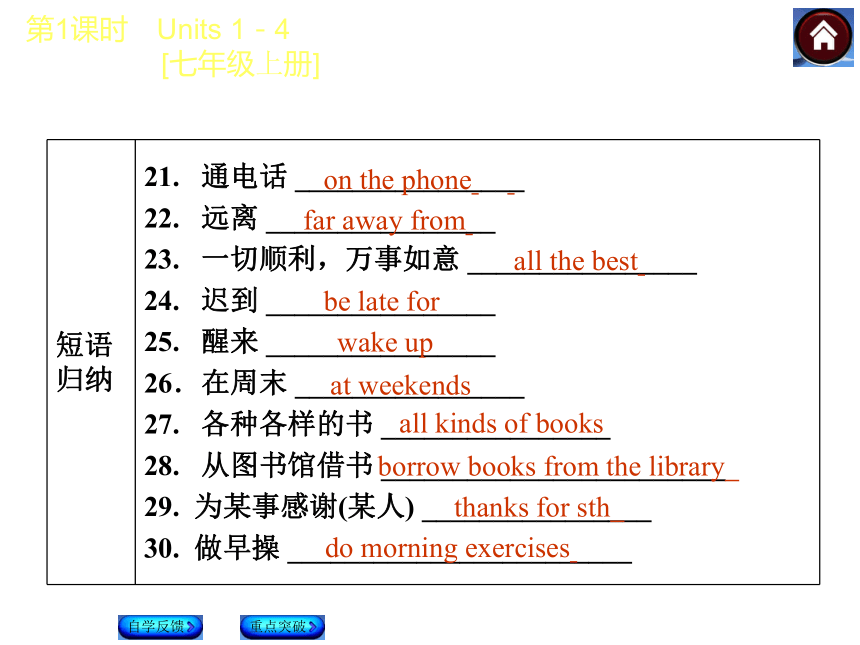
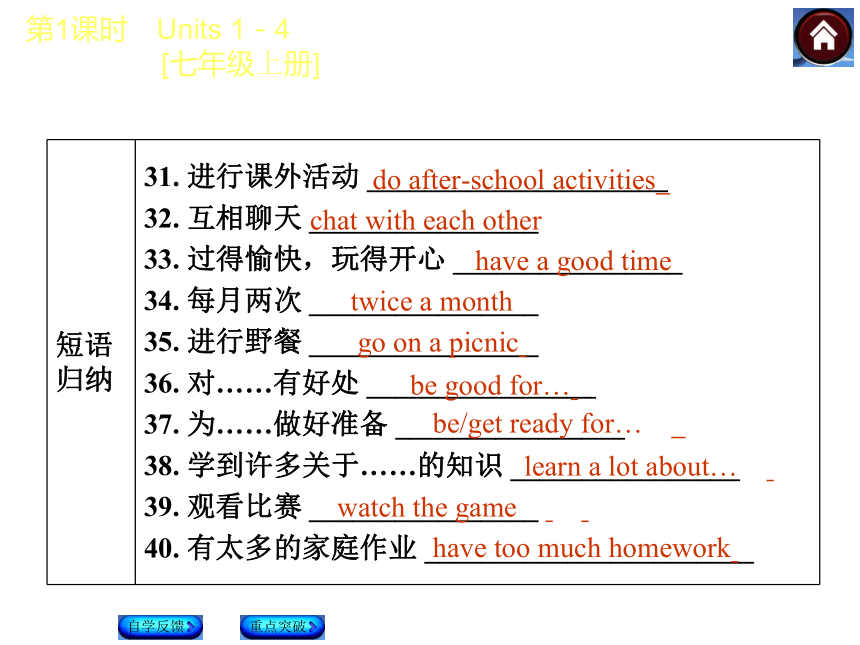
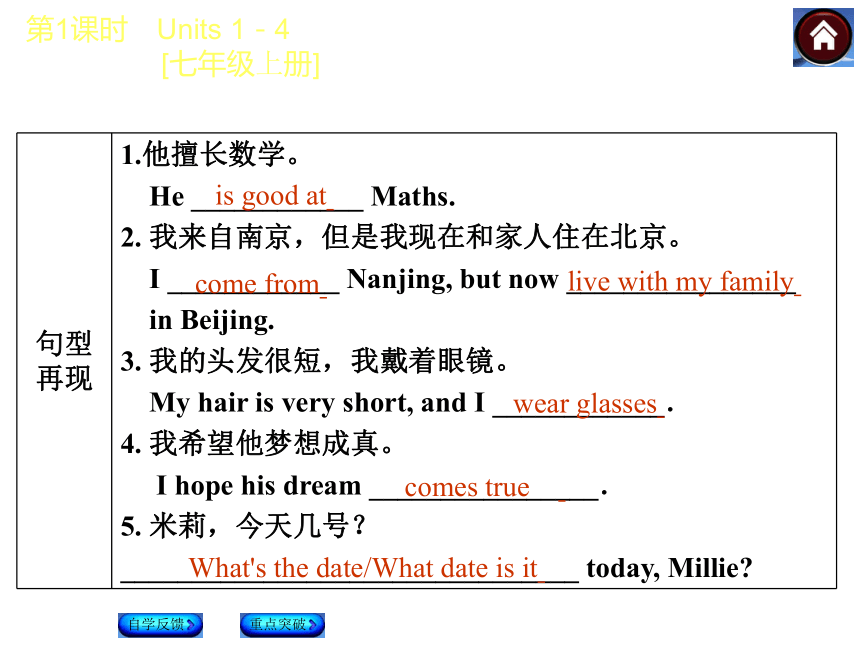
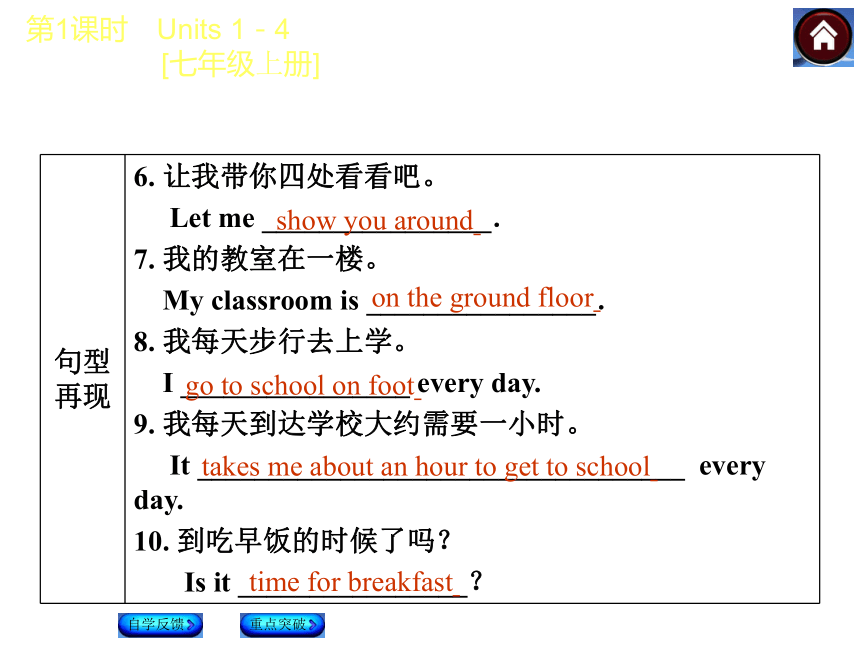
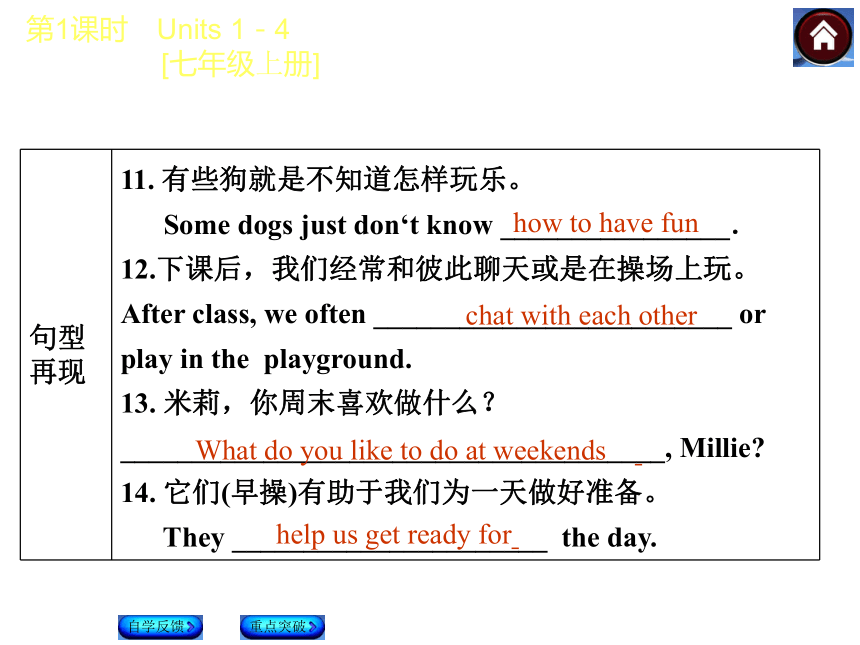
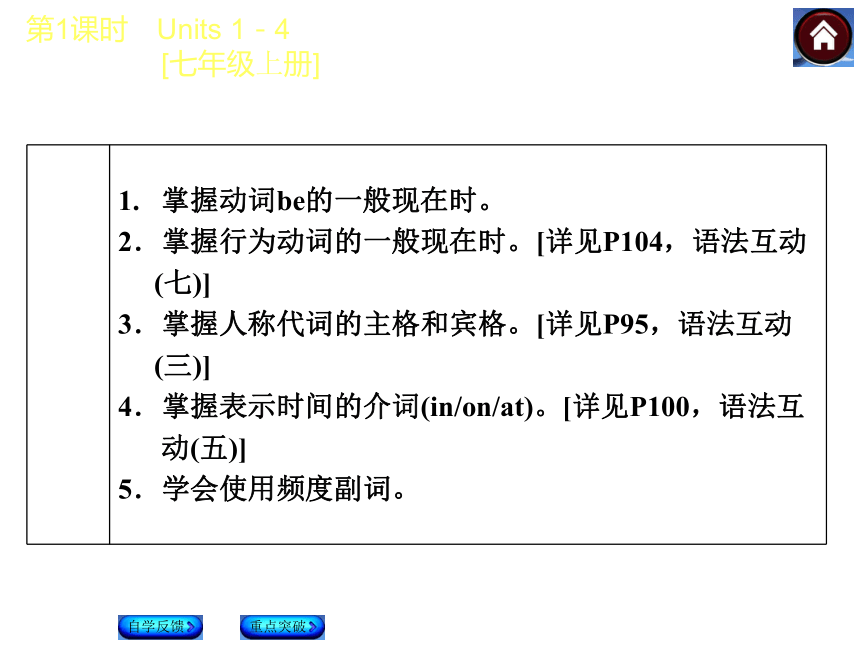
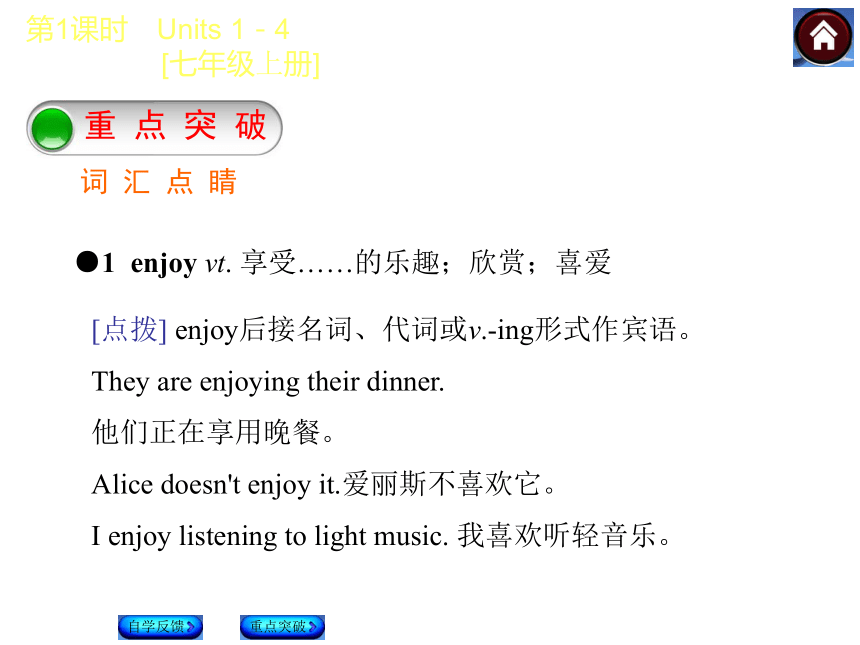
文档简介
课件38张PPT。第1课时 Units 1—4 [七年级上册] 自 学 反 馈重 点 突 破第1课时 Units 1-4
[七年级上册]自 学 反 馈 自学反馈重点突破swimming dancing hobbiesbuilding flies interesting well better best player 第1课时 Units 1-4
[七年级上册]自学反馈重点突破meeting twice dislike matches really 第1课时 Units 1-4
[七年级上册]自学反馈重点突破play football after school come/be from Nanjing be good at Maths wear glasses many times a day my favourite football star a member of… look strong in one's free time go swimming enjoy listening to music make sb happy come true read a lot of interesting books meet at the school gate 第1课时 Units 1-4
[七年级上册]自学反馈重点突破show sb around in front of the classroom building that man in a white shirt say hello to sb walk to school/go to school on foot on the phone far away from all the best be late for wake up 第1课时 Units 1-4
[七年级上册]自学反馈重点突破at weekends all kinds of books borrow books from the library thanks for sth do morning exercises do after-school activities chat with each other have a good time twice a month go on a picnic 第1课时 Units 1-4
[七年级上册]自学反馈重点突破be good for… be/get ready for… learn a lot about… watch the game have too much homework is good at come from What's the date/What date is it live with my family wear glasses comes true 自学反馈重点突破第1课时 Units 1-4
[七年级上册]show you around on the ground floor go to school on foot takes me about an hour to get to school time for breakfast 自学反馈重点突破第1课时 Units 1-4
[七年级上册]how to have fun chat with each other What do you like to do at weekends 自学反馈重点突破第1课时 Units 1-4
[七年级上册]help us get ready for 自学反馈重点突破第1课时 Units 1-4
[七年级上册]词 汇 点 睛●1 enjoy vt. 享受……的乐趣;欣赏;喜爱重 点 突 破自学反馈重点突破第1课时 Units 1-4
[七年级上册][点拨] enjoy后接名词、代词或v.-ing形式作宾语。
They are enjoying their dinner.
他们正在享用晚餐。
Alice doesn't enjoy it.爱丽斯不喜欢它。
I enjoy listening to light music. 我喜欢听轻音乐。
[搭配] enjoy oneself=have a good time=have fun过得愉快;玩得开心
I enjoyed myself very much at the party.
我在聚会上玩得很开心。自学反馈重点突破第1课时 Units 1-4
[七年级上册]● 2 be good at 擅长
[点拨] be good at 表示“擅长某一学科或技能”,也可表示“在……方面做得好”。 其后接名词、代词或v.-ing 形式作宾语,相当于 do well in。
Mike is good at swimming. 迈克擅长游泳。
I am good at English. 我擅长英语。自学反馈重点突破第1课时 Units 1-4
[七年级上册]
●3 else adv. 另外;其他
[拓展] (1)else作副词,与不定代词或不定副词(以-one,-body,-thing,-where结尾的词)连用时,放在这些词的后面。
Would you like something else to drink?
你还要喝点别的什么吗?
We went to the park and nowhere else.
我们到公园去了,没去其他什么地方。
(2)else还可用在疑问代词或疑问副词(如:who, what, where等)后面,表示强调。
Where else did you go?你还去了别的什么地方? 自学反馈重点突破第1课时 Units 1-4
[七年级上册](3)else常与or连用,意为“否则;要不然”。
Let's go, or else we'll miss the train.
咱们走吧,否则就赶不上火车了。
(4)else 有所有格形式(else's)。
He was wearing someone else's coat.
他穿着别人的外套。自学反馈重点突破第1课时 Units 1-4
[七年级上册]● 4 fun n. 享乐,乐趣;有趣的事
We had a lot of fun at the picnic on the beach.
我们在海滩上野餐了,趣味无穷。
It's great fun to sail a boat.扬帆驾舟十分有趣。
Why don't you come with us? It'll be great fun.
为什么不同我们一起去呢? 会很有趣的。
[拓展] fun 用作形容词,意为“使人愉快的;有趣的”。
Thank you for organizing such a fun event.
谢谢你组织了这样一个令人开心的活动。自学反馈重点突破第1课时 Units 1-4
[七年级上册][搭配] for fun 为了高兴;为了好玩
in fun不是当真的;闹着玩的;开玩笑的
have fun (in) doing sth做某事很开心
make fun of sb 嘲笑/取笑某人 自学反馈重点突破第1课时 Units 1-4
[七年级上册]● 5 show v.& n. 展览;演出, 表演
[点拨] (1)show用作动词,意为“给……看”,常见搭配:show sb sth=show sth to sb 给某人看某物
(2)show用作动词,意为“表现, 显露”,常见搭配: show off sth 炫耀某物
(3)show用作动词,意为“为……领路”,常见搭配: show sb around (sp) 带领某人参观(某地); show sb in/out 领某人进来/出去
(4)show用作名词,意为“展示”,常见搭配: on show 展出自学反馈重点突破第1课时 Units 1-4
[七年级上册]
●6 on the phone 通电话
My kids spend hours chatting on the phone with their friends.我的孩子们在电话上和朋友聊天,一聊就是几个小时。
You're wanted on the phone.有人打电话找你。
自学反馈重点突破第1课时 Units 1-4
[七年级上册]●7 wake up 醒来
What time did you wake up this morning?
今天早晨你几点醒的?
[拓展] wake sb up 把某人叫醒
On Sundays she usually wakes up her children a little later than usual.
在星期天,她通常会比平时晚一点叫醒孩子们。自学反馈重点突破第1课时 Units 1-4
[七年级上册]自学反馈重点突破第1课时 Units 1-4
[七年级上册]●8 practise vi.&vt.练习;训练
[点拨] (1)practise用作及物动词时,后面可接名词、代词或动名词作宾语,不能接不定式。
Before she went abroad, she spent as much time as she could practising speaking English.
在出国之前,她花了尽可能多的时间练习说英语。
(2)practise还可用作不及物动词。
Practise more and you'll make progress.
多练习,你会进步的。
[注意] practise的名词形式为practice,为不可数名词。
Practice makes perfect.熟能生巧。
●9 luck n. 运气
[拓展] luck的形容词形式为lucky, 意为“好运的”;它的副词形式为luckily, 意为“幸运地”。
He is lucky enough to pass the exam.
他很幸运地通过了这次考试。
Luckily, the police came right away.
幸运的是, 警察马上就来了。
注意:lucky 加上否定前缀un-, 即unlucky, 意为“不幸的”;它的副词形式为unluckily, 意为“不幸地”。 自学反馈重点突破第1课时 Units 1-4
[七年级上册]● 1 hope和wish
hope 和 wish都有“希望”之意,但用法不同。
(1)hope既可用作动词,又可用作名词,意为“希望, 盼望”, 通常指可以实现的愿望。其常用结构:
①hope for sth ②hope to do sth
③主语+hope+(that)从句
I hope for an early answer to my letter. 我希望早点得到回信。
I hope to go to college. 我希望上大学。
I hope you'll be better soon. 我希望你能很快好起来。巧辨异同自学反馈重点突破第1课时 Units 1-4
[七年级上册]
(2)wish既可用作动词,又可用作名词,意为“希望, 愿望, 心愿”, 通常指不能实现或很难实现的愿望。其常用结构:
①wish for sth ②wish to do sth
③wish sb to do sth ④wish sb sth
⑤主语+wish+(that)从句 (wish后的宾语从句多用过去时态,表示虚拟语气)
Do you wish me to leave now? 你希望我现在就走吗?
I wish you a very happy life. 祝你一生幸福。
I wish I were 30 years younger. 但愿我能年轻三十岁。自学反馈重点突破第1课时 Units 1-4
[七年级上册]自学反馈重点突破第1课时 Units 1-4
[七年级上册]●2 in front of 和 in the front of
(1)in front of 意为“在……前面”, 指在某物外部的前面。
There is a big tree in front of our school gate.
我们学校门前有一棵大树。
(2)in the front of意为“在……的前部”,指在某物内部的前面。
Our teacher is standing in the front of the classroom. 我们的老师正站在教室的前面。自学反馈重点突破第1课时 Units 1-4
[七年级上册]●3 every和each
every和each都含有“每个,各个”的意思,但用法不同。
(1)each既可用作形容词,又可用作代词,在句中作定语、主语、宾语、同位语、状语等。
The students each have a desk. 每个学生都有一张书桌。
Each student in this class gave a different answer.
这个班的每个学生所给的答案各不相同。
(2)each指两个或两个以上的人或事物中的“每个”,更强调个人或个别;every指许多人或事物的“全体”,更强调全体或全部,与all的意思相近。
There are many shops on each side of the street.
这条街的每一侧都有很多家商店。
I know every member of your family.我认识你们家的每个成员。
(3)each 单独作主语或由each、every修饰的单数名词作主语时,谓语动词用单数形式;但each of them作主语时,谓语动词用单数或复数形式均可。
Each/Each person/Every person is living a happy life now.
现在人人都过着幸福的生活。
Each of them are/is wearing full dress.他们每个人都穿着礼服。
(4)表示“每隔……”或“每……”时,要用“every+基数词+复数名词”或“every+序数词+单数名词”结构。这两种结构中的every不能用each替代。
I have a bath every three days in winter.
在冬天,我每隔三天洗一次澡。自学反馈重点突破第1课时 Units 1-4
[七年级上册]
●4 borrow和lend
(1)borrow 指借入,即“向别人借东西”。常用搭配:borrow…from…向/从……借……
I borrowed this dictionary from my teacher.
我从老师那儿借来了这本词典。
(2)lend指借出,即“把自己的东西借给别人”。常用搭配:lend sb sth=lend sth to sb 把某物借给某人
I lent my coat to a friend of my brother's, and I never saw it again.我把外套借给了我哥哥的一个朋友,我就再也没见过那件外套了。自学反馈重点突破第1课时 Units 1-4
[七年级上册]
[拓展] keep 也有“借”的意思,但一般是指借来某物后保存或使用一段时间,因此可以与时间段连用,但borrow和lend不可以。
You can keep my recorder for three days.
你可以借用我的录音机三天。
I have kept this book for one week.
这本书我已经借了一周了。自学反馈重点突破第1课时 Units 1-4
[七年级上册]●1 What's the date today, Millie?米莉,今天几号?
[点拨] 句型“What's the date today?”意为“今天几号”。该句型常用来询问日期,相当于“What date is it today?”
[拓展] (1)询问时间的句型。
—What time is it now/What's the time now?
—It's nine o'clock. It's time for English class.
“现在几点钟?” “九点。该上英语课了。”
(2)询问星期的句型。
—What day is it today?—It's Monday.
“今天星期几?” “星期一。”句 型 透 视自学反馈重点突破第1课时 Units 1-4
[七年级上册]●2 My classroom is on the ground floor.
我的教室在一楼。
[点拨] on the ground floor 意为“在一楼”。
The upstairs rooms are much warmer than those on the ground floor.楼上的房间要比一楼的暖和得多。
[拓展] 在表达“第一层楼”时,英国人通常说the ground floor,美国人则说the first floor;在表达“第二层楼”时,英国人通常说the first floor,美国人则说the second floor。自学反馈重点突破第1课时 Units 1-4
[七年级上册]●3 Is it time for breakfast?
到吃早饭的时候了吗?
[点拨] 句型“It is time for sth” 意为“到做某事的时候了;该做某事了”。for为介词,后接名词。
It is time for class. 该上课了。
[拓展] “It is time for sb to do sth” 意为“到某人做某事的时候了;该某人做某事了”。to为不定式符号,后接动词原形。
It is time for her to answer the question.
该她回答问题了。自学反馈重点突破第1课时 Units 1-4
[七年级上册]●4 They help us get ready for the day.
它们(早操)有助于我们为一天做好准备。
[点拨] (1)help sb (to) do sth 意为“帮助某人做某事”,相当于help sb with sth。
Andy often helps his mother with/do the housework.
安迪经常帮他妈妈做家务。
(2)get ready for sth 意为“为……做好准备”。
Most of the students are busy getting ready for the coming sports meeting.大部分学生正忙于为即将到来的运动会做好准备。 自学反馈重点突破第1课时 Units 1-4
[七年级上册]Ⅰ.用括号内所给词的适当形式填空
1. I have a friend. ________ (she) name is Lucy.
2.Millie, are you good at ________ (sing)?
3.Peter ________ (study) at a middle school near his home.
4.Doing morning exercises ________ (be) good for our health.
5.What about ________ (meet) my old friends?Her singing 自学反馈重点突破第1课时 Units 1-4
[七年级上册]studies ismeeting 自学反馈重点突破第1课时 Units 1-4
[七年级上册]Ⅱ.单项选择
( )1. —Can you ________ my dog for two days?
—Yes, of course.
A.look for B.look at
C.look after D.look like
( )2. —________your classmates all nice to you?
—Yes, ________.
A.Are; you are B.Is; we are
C.Are; they are D.Is; he isCC自学反馈重点突破第1课时 Units 1-4
[七年级上册]( )3.Mr Green makes Linda ________ English every morning.
A.reads B.to read C.reading D.read
( )4. —Lucy is ill, ________ she can't go to school.
—I'm sorry to hear that.
A.but B.so C.for D.or
( )5.—________ does it take you to get to school from your home?
—About half an hour.
A.How far B.How many C.How much D.How longDBD自学反馈重点突破第1课时 Units 1-4
[七年级上册]Ⅲ.根据汉语意思完成句子
1.他上学从来不迟到。
He ________________ school.
2.从周一到周五,埃米很少看电视。
Amy __________________________________ Friday.
3.你能帮我从你的朋友那儿借一辆自行车吗?
Can you _____________________________ your friend?
4.你妹妹放学后喜欢做什么?
____________ your sister ____________ after school?
5.我的一些新朋友来自北京。
Some of my new friends ____________ Beijing.
is never late for seldom watches TV from Monday to help me borrow a bike from What does like doing come/are from
[七年级上册]自 学 反 馈 自学反馈重点突破swimming dancing hobbiesbuilding flies interesting well better best player 第1课时 Units 1-4
[七年级上册]自学反馈重点突破meeting twice dislike matches really 第1课时 Units 1-4
[七年级上册]自学反馈重点突破play football after school come/be from Nanjing be good at Maths wear glasses many times a day my favourite football star a member of… look strong in one's free time go swimming enjoy listening to music make sb happy come true read a lot of interesting books meet at the school gate 第1课时 Units 1-4
[七年级上册]自学反馈重点突破show sb around in front of the classroom building that man in a white shirt say hello to sb walk to school/go to school on foot on the phone far away from all the best be late for wake up 第1课时 Units 1-4
[七年级上册]自学反馈重点突破at weekends all kinds of books borrow books from the library thanks for sth do morning exercises do after-school activities chat with each other have a good time twice a month go on a picnic 第1课时 Units 1-4
[七年级上册]自学反馈重点突破be good for… be/get ready for… learn a lot about… watch the game have too much homework is good at come from What's the date/What date is it live with my family wear glasses comes true 自学反馈重点突破第1课时 Units 1-4
[七年级上册]show you around on the ground floor go to school on foot takes me about an hour to get to school time for breakfast 自学反馈重点突破第1课时 Units 1-4
[七年级上册]how to have fun chat with each other What do you like to do at weekends 自学反馈重点突破第1课时 Units 1-4
[七年级上册]help us get ready for 自学反馈重点突破第1课时 Units 1-4
[七年级上册]词 汇 点 睛●1 enjoy vt. 享受……的乐趣;欣赏;喜爱重 点 突 破自学反馈重点突破第1课时 Units 1-4
[七年级上册][点拨] enjoy后接名词、代词或v.-ing形式作宾语。
They are enjoying their dinner.
他们正在享用晚餐。
Alice doesn't enjoy it.爱丽斯不喜欢它。
I enjoy listening to light music. 我喜欢听轻音乐。
[搭配] enjoy oneself=have a good time=have fun过得愉快;玩得开心
I enjoyed myself very much at the party.
我在聚会上玩得很开心。自学反馈重点突破第1课时 Units 1-4
[七年级上册]● 2 be good at 擅长
[点拨] be good at 表示“擅长某一学科或技能”,也可表示“在……方面做得好”。 其后接名词、代词或v.-ing 形式作宾语,相当于 do well in。
Mike is good at swimming. 迈克擅长游泳。
I am good at English. 我擅长英语。自学反馈重点突破第1课时 Units 1-4
[七年级上册]
●3 else adv. 另外;其他
[拓展] (1)else作副词,与不定代词或不定副词(以-one,-body,-thing,-where结尾的词)连用时,放在这些词的后面。
Would you like something else to drink?
你还要喝点别的什么吗?
We went to the park and nowhere else.
我们到公园去了,没去其他什么地方。
(2)else还可用在疑问代词或疑问副词(如:who, what, where等)后面,表示强调。
Where else did you go?你还去了别的什么地方? 自学反馈重点突破第1课时 Units 1-4
[七年级上册](3)else常与or连用,意为“否则;要不然”。
Let's go, or else we'll miss the train.
咱们走吧,否则就赶不上火车了。
(4)else 有所有格形式(else's)。
He was wearing someone else's coat.
他穿着别人的外套。自学反馈重点突破第1课时 Units 1-4
[七年级上册]● 4 fun n. 享乐,乐趣;有趣的事
We had a lot of fun at the picnic on the beach.
我们在海滩上野餐了,趣味无穷。
It's great fun to sail a boat.扬帆驾舟十分有趣。
Why don't you come with us? It'll be great fun.
为什么不同我们一起去呢? 会很有趣的。
[拓展] fun 用作形容词,意为“使人愉快的;有趣的”。
Thank you for organizing such a fun event.
谢谢你组织了这样一个令人开心的活动。自学反馈重点突破第1课时 Units 1-4
[七年级上册][搭配] for fun 为了高兴;为了好玩
in fun不是当真的;闹着玩的;开玩笑的
have fun (in) doing sth做某事很开心
make fun of sb 嘲笑/取笑某人 自学反馈重点突破第1课时 Units 1-4
[七年级上册]● 5 show v.& n. 展览;演出, 表演
[点拨] (1)show用作动词,意为“给……看”,常见搭配:show sb sth=show sth to sb 给某人看某物
(2)show用作动词,意为“表现, 显露”,常见搭配: show off sth 炫耀某物
(3)show用作动词,意为“为……领路”,常见搭配: show sb around (sp) 带领某人参观(某地); show sb in/out 领某人进来/出去
(4)show用作名词,意为“展示”,常见搭配: on show 展出自学反馈重点突破第1课时 Units 1-4
[七年级上册]
●6 on the phone 通电话
My kids spend hours chatting on the phone with their friends.我的孩子们在电话上和朋友聊天,一聊就是几个小时。
You're wanted on the phone.有人打电话找你。
自学反馈重点突破第1课时 Units 1-4
[七年级上册]●7 wake up 醒来
What time did you wake up this morning?
今天早晨你几点醒的?
[拓展] wake sb up 把某人叫醒
On Sundays she usually wakes up her children a little later than usual.
在星期天,她通常会比平时晚一点叫醒孩子们。自学反馈重点突破第1课时 Units 1-4
[七年级上册]自学反馈重点突破第1课时 Units 1-4
[七年级上册]●8 practise vi.&vt.练习;训练
[点拨] (1)practise用作及物动词时,后面可接名词、代词或动名词作宾语,不能接不定式。
Before she went abroad, she spent as much time as she could practising speaking English.
在出国之前,她花了尽可能多的时间练习说英语。
(2)practise还可用作不及物动词。
Practise more and you'll make progress.
多练习,你会进步的。
[注意] practise的名词形式为practice,为不可数名词。
Practice makes perfect.熟能生巧。
●9 luck n. 运气
[拓展] luck的形容词形式为lucky, 意为“好运的”;它的副词形式为luckily, 意为“幸运地”。
He is lucky enough to pass the exam.
他很幸运地通过了这次考试。
Luckily, the police came right away.
幸运的是, 警察马上就来了。
注意:lucky 加上否定前缀un-, 即unlucky, 意为“不幸的”;它的副词形式为unluckily, 意为“不幸地”。 自学反馈重点突破第1课时 Units 1-4
[七年级上册]● 1 hope和wish
hope 和 wish都有“希望”之意,但用法不同。
(1)hope既可用作动词,又可用作名词,意为“希望, 盼望”, 通常指可以实现的愿望。其常用结构:
①hope for sth ②hope to do sth
③主语+hope+(that)从句
I hope for an early answer to my letter. 我希望早点得到回信。
I hope to go to college. 我希望上大学。
I hope you'll be better soon. 我希望你能很快好起来。巧辨异同自学反馈重点突破第1课时 Units 1-4
[七年级上册]
(2)wish既可用作动词,又可用作名词,意为“希望, 愿望, 心愿”, 通常指不能实现或很难实现的愿望。其常用结构:
①wish for sth ②wish to do sth
③wish sb to do sth ④wish sb sth
⑤主语+wish+(that)从句 (wish后的宾语从句多用过去时态,表示虚拟语气)
Do you wish me to leave now? 你希望我现在就走吗?
I wish you a very happy life. 祝你一生幸福。
I wish I were 30 years younger. 但愿我能年轻三十岁。自学反馈重点突破第1课时 Units 1-4
[七年级上册]自学反馈重点突破第1课时 Units 1-4
[七年级上册]●2 in front of 和 in the front of
(1)in front of 意为“在……前面”, 指在某物外部的前面。
There is a big tree in front of our school gate.
我们学校门前有一棵大树。
(2)in the front of意为“在……的前部”,指在某物内部的前面。
Our teacher is standing in the front of the classroom. 我们的老师正站在教室的前面。自学反馈重点突破第1课时 Units 1-4
[七年级上册]●3 every和each
every和each都含有“每个,各个”的意思,但用法不同。
(1)each既可用作形容词,又可用作代词,在句中作定语、主语、宾语、同位语、状语等。
The students each have a desk. 每个学生都有一张书桌。
Each student in this class gave a different answer.
这个班的每个学生所给的答案各不相同。
(2)each指两个或两个以上的人或事物中的“每个”,更强调个人或个别;every指许多人或事物的“全体”,更强调全体或全部,与all的意思相近。
There are many shops on each side of the street.
这条街的每一侧都有很多家商店。
I know every member of your family.我认识你们家的每个成员。
(3)each 单独作主语或由each、every修饰的单数名词作主语时,谓语动词用单数形式;但each of them作主语时,谓语动词用单数或复数形式均可。
Each/Each person/Every person is living a happy life now.
现在人人都过着幸福的生活。
Each of them are/is wearing full dress.他们每个人都穿着礼服。
(4)表示“每隔……”或“每……”时,要用“every+基数词+复数名词”或“every+序数词+单数名词”结构。这两种结构中的every不能用each替代。
I have a bath every three days in winter.
在冬天,我每隔三天洗一次澡。自学反馈重点突破第1课时 Units 1-4
[七年级上册]
●4 borrow和lend
(1)borrow 指借入,即“向别人借东西”。常用搭配:borrow…from…向/从……借……
I borrowed this dictionary from my teacher.
我从老师那儿借来了这本词典。
(2)lend指借出,即“把自己的东西借给别人”。常用搭配:lend sb sth=lend sth to sb 把某物借给某人
I lent my coat to a friend of my brother's, and I never saw it again.我把外套借给了我哥哥的一个朋友,我就再也没见过那件外套了。自学反馈重点突破第1课时 Units 1-4
[七年级上册]
[拓展] keep 也有“借”的意思,但一般是指借来某物后保存或使用一段时间,因此可以与时间段连用,但borrow和lend不可以。
You can keep my recorder for three days.
你可以借用我的录音机三天。
I have kept this book for one week.
这本书我已经借了一周了。自学反馈重点突破第1课时 Units 1-4
[七年级上册]●1 What's the date today, Millie?米莉,今天几号?
[点拨] 句型“What's the date today?”意为“今天几号”。该句型常用来询问日期,相当于“What date is it today?”
[拓展] (1)询问时间的句型。
—What time is it now/What's the time now?
—It's nine o'clock. It's time for English class.
“现在几点钟?” “九点。该上英语课了。”
(2)询问星期的句型。
—What day is it today?—It's Monday.
“今天星期几?” “星期一。”句 型 透 视自学反馈重点突破第1课时 Units 1-4
[七年级上册]●2 My classroom is on the ground floor.
我的教室在一楼。
[点拨] on the ground floor 意为“在一楼”。
The upstairs rooms are much warmer than those on the ground floor.楼上的房间要比一楼的暖和得多。
[拓展] 在表达“第一层楼”时,英国人通常说the ground floor,美国人则说the first floor;在表达“第二层楼”时,英国人通常说the first floor,美国人则说the second floor。自学反馈重点突破第1课时 Units 1-4
[七年级上册]●3 Is it time for breakfast?
到吃早饭的时候了吗?
[点拨] 句型“It is time for sth” 意为“到做某事的时候了;该做某事了”。for为介词,后接名词。
It is time for class. 该上课了。
[拓展] “It is time for sb to do sth” 意为“到某人做某事的时候了;该某人做某事了”。to为不定式符号,后接动词原形。
It is time for her to answer the question.
该她回答问题了。自学反馈重点突破第1课时 Units 1-4
[七年级上册]●4 They help us get ready for the day.
它们(早操)有助于我们为一天做好准备。
[点拨] (1)help sb (to) do sth 意为“帮助某人做某事”,相当于help sb with sth。
Andy often helps his mother with/do the housework.
安迪经常帮他妈妈做家务。
(2)get ready for sth 意为“为……做好准备”。
Most of the students are busy getting ready for the coming sports meeting.大部分学生正忙于为即将到来的运动会做好准备。 自学反馈重点突破第1课时 Units 1-4
[七年级上册]Ⅰ.用括号内所给词的适当形式填空
1. I have a friend. ________ (she) name is Lucy.
2.Millie, are you good at ________ (sing)?
3.Peter ________ (study) at a middle school near his home.
4.Doing morning exercises ________ (be) good for our health.
5.What about ________ (meet) my old friends?Her singing 自学反馈重点突破第1课时 Units 1-4
[七年级上册]studies ismeeting 自学反馈重点突破第1课时 Units 1-4
[七年级上册]Ⅱ.单项选择
( )1. —Can you ________ my dog for two days?
—Yes, of course.
A.look for B.look at
C.look after D.look like
( )2. —________your classmates all nice to you?
—Yes, ________.
A.Are; you are B.Is; we are
C.Are; they are D.Is; he isCC自学反馈重点突破第1课时 Units 1-4
[七年级上册]( )3.Mr Green makes Linda ________ English every morning.
A.reads B.to read C.reading D.read
( )4. —Lucy is ill, ________ she can't go to school.
—I'm sorry to hear that.
A.but B.so C.for D.or
( )5.—________ does it take you to get to school from your home?
—About half an hour.
A.How far B.How many C.How much D.How longDBD自学反馈重点突破第1课时 Units 1-4
[七年级上册]Ⅲ.根据汉语意思完成句子
1.他上学从来不迟到。
He ________________ school.
2.从周一到周五,埃米很少看电视。
Amy __________________________________ Friday.
3.你能帮我从你的朋友那儿借一辆自行车吗?
Can you _____________________________ your friend?
4.你妹妹放学后喜欢做什么?
____________ your sister ____________ after school?
5.我的一些新朋友来自北京。
Some of my new friends ____________ Beijing.
is never late for seldom watches TV from Monday to help me borrow a bike from What does like doing come/are from
